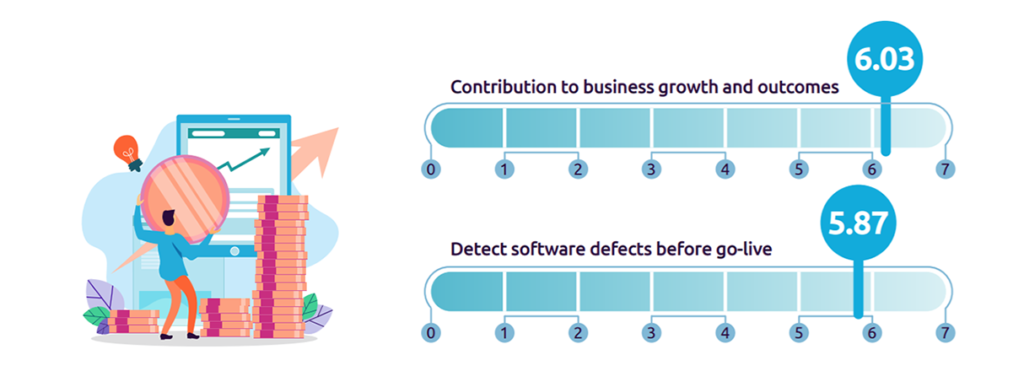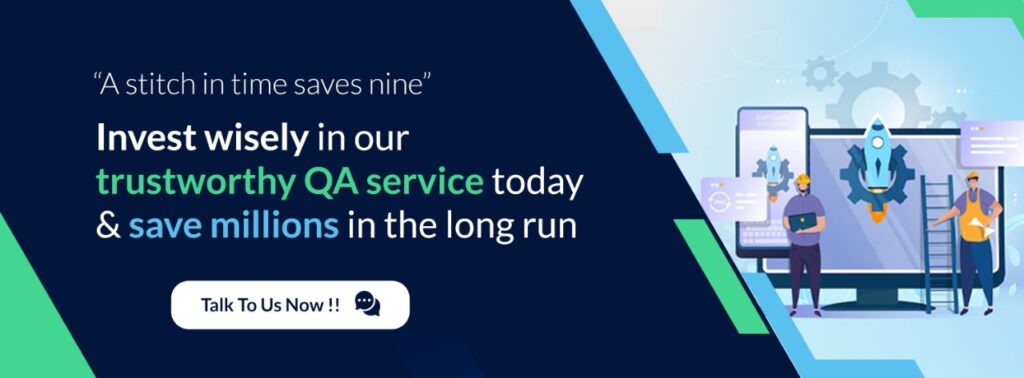Accelerate Success with AI-Powered Test Automation – Smarter, Faster, Flawless
Start free trialManual Testing is evergreen. However, the zest to expedite the testing process and reduce human intervention paved the way to Automation testing 20 years back and AI Automation is now becoming the need of the hour. Who doesn’t love continuous delivery? With an aim to achieve collaboration across teams, integrate customer feedback on the go, and target small but incremental rapid releases, more and more teams are going the Agile DevOps way. Continuous delivery is the ultimate goal, and Continuous testing is the way to achieve it.
The 11th edition of the World Quality Report decodes the role of software quality in assuring business growth and outcomes. As per the report, test automation is the biggest bottleneck to deliver “Quality at Speed,” as it is an enabler of successful Agile and DevOps adoption.
Contribution to Business Growth and Outcomes Rated Most Important QA Priority by IT and Business

Continuous testing is the process of executing automated tests as part of the software delivery pipeline to obtain immediate feedback on the business risks associated with the latest build.
It requires automated processes to achieve agility to build, test, release and deploy the software. Each build goes through Integration testing on the build server, Functional testing and regression testing on the test server, Deployment testing on the staging server. If the build passes, it advances to the next step. If it fails, it’s time to stop and fix the issue.
How do You Choose an Automation Tool for Your Team?
There are a plethora of open-source and commercial automation tools to choose from. You have IBM Rational Functional Tester, Test Project, Accelq to name a few. With such a broad range of tools available, organizations can find it daunting to choose the best one that conforms to their project requirements. However, Selenium is the most preferred tool. As per the HG Insights report, around 62,698 companies use Selenium.
What is Selenium
Selenium is a free open source suite for automated testing for web applications across different browsers and platforms. Selenium focuses on automating web-based applications. You can use multiple programming languages like Java, C#, Python, etc to create Selenium Test Scripts. Selenium Software is not just a single tool but a suite of software, each piece catering to different testing needs of an organization.

Selenium is considered among the top tools for browser-based and cross-platform regression testing due to the following factors:
- It’s an Open source framework
- Provides Multi-Browser Support
- Multi-Language and Multiplatform support capability
- Parallel and fast test cases execution
Selenium vs Webomates CQ
All said and done, there are a few limitations of using Selenium. To overcome these limitations, there is a need for a framework that ensures an all-in-one service. And that’s where Webomates steps in!
In this article, know how Webomates manoeuvre each of those limitations:

How Webomates CQ leverages Selenium and Provides More Value
Webomates has built an advanced framework to test Web and API applications by adding many libraries and making the framework stronger. Webomates Automation framework supports UI, API, Mobile Web, Mobile Native, and Visual testing. This single framework has different capabilities to run the functional UI scripts on multiple browsers on both desktop and Mobile. A library is integrated with Selenium for API automation.
Further, the platform is added with Appium capabilities to have Automation for Mobile applications. For every automated test execution, a video or image file is generated as an artifact which helps in better reporting capabilities. The platform also includes the Galen tool to perform visual testing of web applications which generates all the element location and attributes report at the end which clearly shows the pixel by pixel comparison of the element.
The strength of this platform is the effective collaboration of the API, Web, and Mobile frameworks thus resolving the problem of single framework availability.
With Selenium included in the offering, Webomates CQ is a continuous testing solution and has the following capabilities:
1. No Code testing
The same system performs functional and non-functional testing. Performance and security testing are layered on as needed. With no onboarding time required and regression testing available at just the click of a button, Webomates CQ gives you an all-in-one testing service.
2. Self Healing
Webomates helps you to scale up by getting the build checks done via various regression services like FULL in staging environments, Overnight modular test suites at lower environments like integration, and mini test suites in Developer environments. As the full regressions and modular tests include healing of the test cases and test scripts for modified features, the test suite is near UpToDate at all times.
3. Auditable Logs
Artifacts and logs are generated for every executed test case. Additionally, the patented AI Defect Predictor tool helps in the quick analysis by providing recommendations for executing test cases that got failed by Automation. The tool analyzes the failure quickly and as per the results, 300 test cases failure analysis can be done in 3 hours where traditional tools take up more than a day in the analysis.
4. Traiged defects in guaranteed time
Webomates has the capability to provide near-instant results. Webomates shares real-time test results for every regression cycle getting executed through the CQ portal. As the test results are available in the form of summaries, screenshots, and videos, it helped save a lot of time. The time to review a defect is typically 20 seconds which is the time of each defect video that shows the setup and the defect occurring.

Conclusion
With Webomates CQ as TAAS (Testing as a Service), it’s a lot easier to identify and fix the defects in the staging environment itself. This gives an immense boost of confidence to the developers to deploy the changes into the production environment. With an equal focus on functional testing and non-functional testing, Webomates bridges the gaps between business logic and user experience.
Webomates has proven records of exhibiting agility in scaling up its testing services based on the changing requirements. With a goal to help organizations achieve accelerated feature velocity, Webomates embeds the Shift-Left approach and carries out software features and regression testing in guaranteed timeframes. It has the expertise, framework, and tools to optimize your QA efforts.
Read the article Shift Left Testing in Agile to know how the Shift-left approach helps in building a good product where UI, API, Load, and Security are not left out to be tested as a different component at the end. If you are interested in learning more about Webomates’ CQ service please click here and schedule a demo, or reach out to us at info@webomates.com
Tags: Automation, DevOps

Leave a Reply